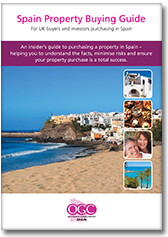When you purchase a property in Spain you will need to assign a legally trained representative of the state called a notario (notary).
He or she will not replace your solicitor, but is a public official who is required to ensure that property transactions are carried out correctly and that all taxes due relating to the sale of a property be paid to the government. You cannot use him as your agent or give him instructions in the way you would a solicitor. However, the notario can give you lots of useful advice.
The notario does not only oversee property contracts but also wills. It is he who will make sure your foreign money transfer is registered when you buy a property in Spain. He will also register company charters and the official minutes of a community of property owners. He will also help a landlord should he or she wish to notify a tenant of the desire to terminate the tenancy when the rental contract ends.
The notario’s fees are fixed by law and payable by you, the client. The first occasion you are likely to meet a notario is when you sign the purchase contract for a Spanish property at his office. He will then send on the contract to the Property Registry for inscription. The original property contract “escritura” remains with the notario and you can request an authorised copy at any time. He also retains the original copy of any will made at his office.
A notario will also write an official letter if you wish to inform a tenant of your property that you intend terminating the rental when the lease ends or for other official notifications.
For many years notarios have registered sales contracts which did not represent the true purchase price (under-declaration of true amount) and they chose not to get involved with any taxes, leaving that to the purchaser’s solicitor. Much has changed recently and these day notarios are compelled to warn the various parties involved in a sales contract that if they undervalue a property by more than 20 per cent (and this could change again), they will be heavily fined by the Hacienda, the Spanish Tax Authority should they discover the discrepancy.
They are also required to confirm that five per cent of the purchase price is retained and paid directly to the Hacienda after the sale of a property by a non-resident of Spain as a guarantee against capital gains tax.
When you are in his office to sign the escritura, the notario must confirm the personal details and identities of all concerned with the sales contract and he will then read the contract aloud, usually in Spanish, so you will need someone like your solicitor or a translator to be present as you must be sure the title deeds are correct. In fact, some notarios will insist that there is an English speaking lawyer or translator with you before they agree to sign the deeds.
He or she will have to make some legal checks, but these differ from region to region. Generally though, he should have asked for a property registry filing before the signing of the escritura to confirm that the vendor is indeed the owner of the property and that the property has no debts or tenants or other unexpected problems. In itself, this doesn’t give you full protection so it is very important that you engage your own solicitor to represent you, just as you would in the UK.
The Spanish government set the notario’s fees and these are payable according to the declared value of the property and also the number of clauses contained in the deeds. The fees may be from 0.1 per cent to 0.4 per cent of the declared value, the lower amount for more expensive properties and the higher for those of smaller value. In addition, if you have obtained a mortgage on the property you will be required to pay the notario’s fees for the mortgage deeds.
Usually, the notario is one of the less costly aspects of property purchase in Spain and his fees for wills are around €75 if they are uncomplicated. Notarios will give you good advice on a range of matters but you should not consider him an alternative to your own lawyer.
For details of property for sale in Spain, visit the Spain listings on Rightmove Overseas. One way to save money when buying in Spain is to use a currency specialist when transferring your pounds into euros to complete the purchase of your property. For more information on this, contact Smart Currency Exchange.
By Sally Veal of the SpainBuyingGuide.com
To understand the full step-by-step process to buying a property in Spain, collect The Overseas Guides Company’s ‘Spain Property Buying Guide’

